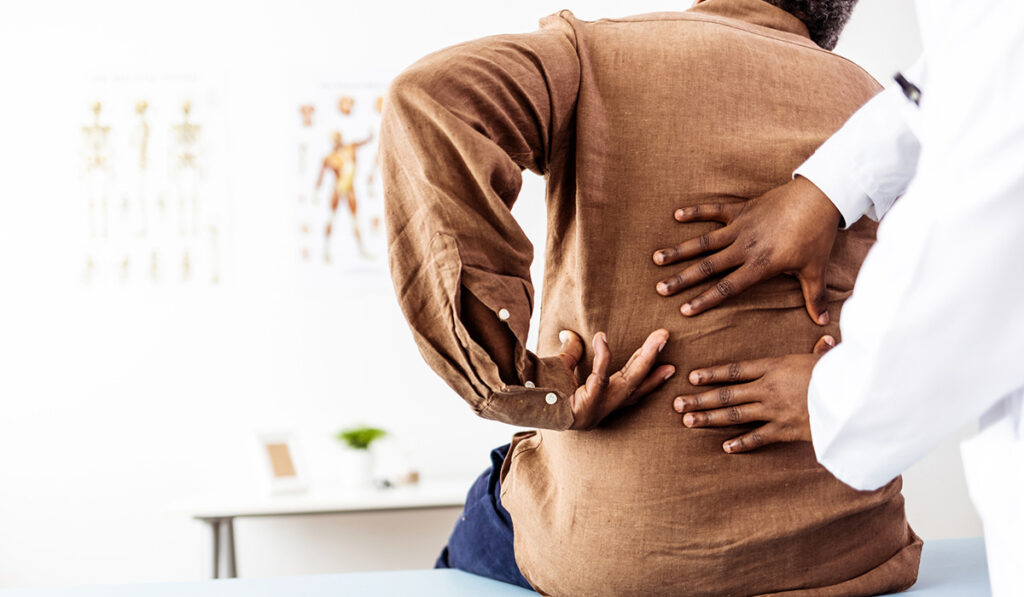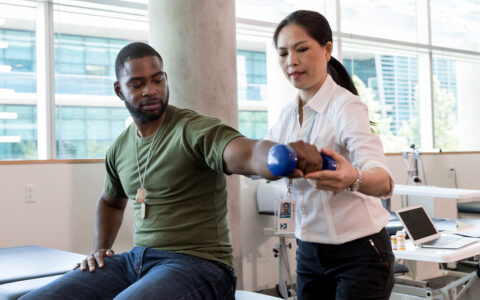Spine conditions are a leading cause of disability worldwide, with more than a half-billion individuals experiencing back pain and with it a cascade of risks to overall health and family income.
In 2017, the World Health Organization launched the Rehabilitation 2030 initiative, a concerted and coordinated global effort to scale up rehabilitation for spine patients. Two years later, four nongovernmental organizations – EUROSPINE, the North American Spine Society, the German Spine Society, and the Saudi Spine Society – formed SPINE20, an advocacy group to bring global attention to spine disorders. The group meets annually ahead of the G20 summit to share its recommendations with international health ministers.
William Sullivan, M.D., a professor and vice chair in the Department of Physical Medicine and Rehabilitation at Vanderbilt University Medical Center, serves on the SPINE20 steering committee and was president of the North American Spine Society in 2019-2020.
“Spine rehabilitation means prosperity. When you can’t care for your family, it’s an economic burden for you and for your community.”
“SPINE20 emerged from an understanding that spine conditions are a huge problem globally – not necessarily mortality but morbidity, disability,” Sullivan said. “Spine rehabilitation means prosperity. When you can’t care for your family, it’s an economic burden for you and for your community.”
Agenda for Value-Based Care
At the 2021 SPINE20 meeting, six recommendations emerged to improve care: expand telehealth; adopt interprofessional spine care services; invest in the development of a competent rehabilitation workforce; promote daily physical activity among the elderly; and promote strategies to transfer evidence-based advances. In total, 27 societies worldwide have endorsed the recommendations.
“We’ve tried to limit our recommendations to a manageable number to keep it simple,” Sullivan noted. “These are actionable items that can be applied by people in a variety of different geographic areas. Our goal is to implement a framework for success.”
SPINE20’s recommendations span the multiple disciplines that engage in spine care.
“My specialty is physical medicine and rehabilitation, and we’re a relatively small part of the group. But the nice part about SPINE20 is that we’re looking at the entirety of spine care – epidemiologists, non-surgeons, surgeons,” Sullivan said. “In some countries surgeons do more non-surgical procedures due to lack of resources, so it’s very rewarding because we’re not just looking at surgery.”
One area of focus is the impact of the COVID-19 pandemic, which has led to a reduction in the availability and access of surgical and rehabilitation care, as well as a breakdown in trust, Sullivan says. The group predicts that the burden of spine disorders will likely increase due to unmet rehabilitation needs and the growing number of people living with long COVID.
Addressing Prevention and Infrastructure
SPINE20 promotes spine disability prevention strategies that lead to healthier populations.
In the elderly, spinal degenerative diseases and vertebral fractures are increasing significantly worldwide, Sullivan says, creating a social and financial burden. SPINE20 recommends adopting government policies and recommendations that promote physical activity and exercise, proper nutrition, and a smoking-free lifestyle to reduce the severity of osteoporosis and frailty, improve ambulation and increase the ability to carry out daily activities.
Other causes of spinal disability vary greatly among nations, Sullivan notes.
“For instance, Saudi Arabia has a huge problem with traumatic spinal cord injuries due to lack of seatbelt use. African and Middle Eastern countries have many spinal cord injuries due to shootings. India and other subcontinent nations have a much greater issue with tuberculosis of the spine and issues related to delayed care of scoliosis.”
What can countries do to prevent some of these conditions and deliver the best care?
“We ask if they need more money for research, for infrastructure, for public health initiatives,” Sullivan said. “Different situations have different infrastructure issues, the availability of surgical instruments, for example, or how far people live from health care centers. What are the different patient populations and what is their access to care?”
Achieving Effectiveness
SPINE20 establishes high educational standards for spine-care providers to ensure quality throughout the world. The group also supports using evidence-based research to manage spine conditions and improve spine care.
“It’s not SPINE20’s role to provide the research, but we want the participating societies to ensure that scientists are using the best evidence,” Sullivan said.
SPINE20 subgroups meet biweekly or monthly to monitor progress and keep the process moving.
“We all understand that the recommendations will not be implemented immediately. Anyone who does advocacy work knows it takes time.”





